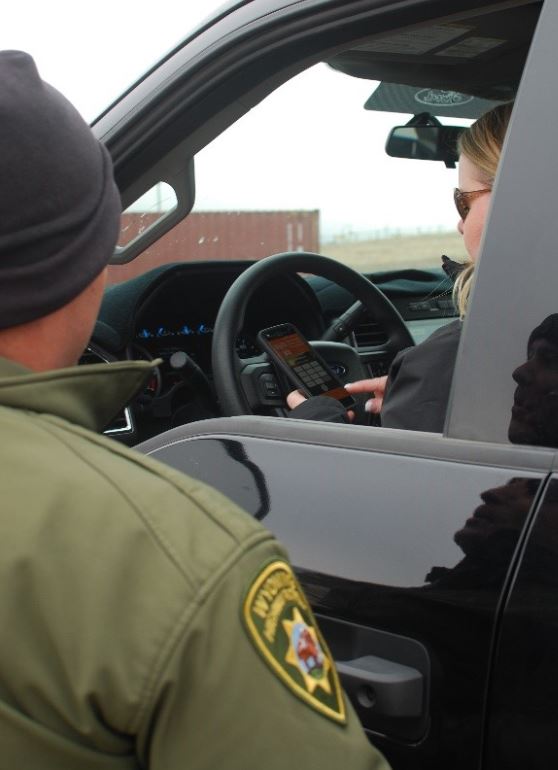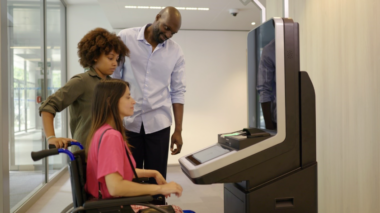
As we explore the implications of real-world implementation of digital driver’s licenses, it’s clear that the number of impacted parties is quite vast. One of the entities with primary input in the way DDL technology takes shape is law enforcement. Frictionless and reliable interaction with the DDL in the field is critical to the successful adoption of DDL for law enforcement verification.
To find out first-hand what some of the considerations, concerns, and perceived benefits DDL will bring to law enforcement and the communities in which they serve, we sat down with Wyoming Highway Patrol’s own Captain Karl Germain.
Question: Why do you think Wyoming in particular is interested in being an early adopter of DDL?
Answer: The state of Wyoming is really a forward-thinking state. We embrace new technology and we have always worked to bring the latest and best services to our residents – from the way they interact with law enforcement to our civil services and now to our driver’s license and ID program. I think the DDL makes sense for Wyoming for a lot of reasons. Our relatively small population makes putting something like this in place much easier. The remote accessibility of the DDL is also really beneficial for our state, as our residents are geographically very spread out, and being able to update their DDL in real-time without a trip to the DMV could be especially helpful.
Question: What do you think would be the strongest DDL benefit realized by law enforcement?
Answer: I think for law enforcement the efficiency and reliability of information are the strongest benefits. The fact that the license-holder’s information is sent directly to the police cruiser almost immediately is going to allow for less time spent roadside. WY Highway Patrol also recently updated our software and equipment in our patrol laptops, so having something that could integrate easily with that and bring new benefits, like automatic data population on citations, would be really beneficial. The DDL also brings a lot of peace of mind for law enforcement that we know that the information on the credential is reflective of the most up-to-date information in the DMV database. If someone’s driving privileges have been suspended or revoked, the DDL would show that in real-time.

Question: What are the most important things a DDL needs to have to allow for adoption by law enforcement?
Answer: First, it needs to be simple and safe. Ensuring the safety of our officers and of the public is absolutely essential. The fact that the DDL doesn’t require a person to hand over their phone or anything like that is really important in making sure that an officer can follow his normal procedure and that there is no liability for handling the person’s phone. The DDL must also be reliable in any condition or situation. We were particularly interested in the technology because of the fact that it operates offline – it doesn’t need WiFi or even cell phone service to work, which is a very real possibility in a large part of our state.
Question: What concerns might you have about the practicalities of a full-scale DDL implication?
Answer: I think with any new technology there are going to be bugs and issues you have to work through. People are going to have to get used to how the DDL works – not just with law enforcement, but in all of the various scenarios – and there can be some learning curve with that. It’s also obviously a massive undertaking that touches a lot of different areas. We are talking about something that requires the participation of government agencies and organizations, private citizens, businesses and retailers, liquor control, banks, the airport, etc. There are a lot of different parties that need to be involved, and even though that can happen over time, it is something that will require a lot of cooperation. But I think the long-term benefits of a DDL definitely make it worth it.

Question: Talking about those long-term benefits, what do you think is the strongest benefit a DDL would bring to private citizens and end-users?
Answer: Convenience is definitely one of the most appealing benefits for the public. People use their phone for so many different things now, so adding your ID to that just makes sense. I also think people will appreciate the fact that you only have to share the information that is required in a given scenario – such as if you need to prove that you are old enough to purchase alcohol – and everything else, like your name or home address, stays private. That added privacy and control of your own personal information is something people are really looking for these days.
Question: When do you think the timing makes sense for a DDL to become a reality – both in WY and in other states?
Answer: I think Wyoming is ready. We are excited, and I really hope we see something happen in the next year. I can’t speak for other states, but I honestly don’t know why they wouldn’t be looking at this concept right now. I think a digital ID is more a question of “when and how,” rather than a question of “if” it happens. We have already seen tests happening in different states and the concept seems to be gaining traction in a lot of areas. I am really glad that WY is able to be on the forefront and be helping to define the direction; and the fact that our law enforcement specifically has been a part of the conversation since the beginning will really help to ensure a DDL becomes a reality in the state of WY.
To hear more of the expert opinion offered by Captain Germain, check out the live action interview clip below:


